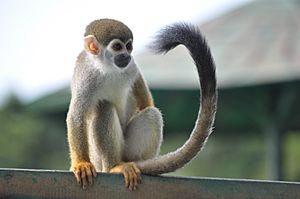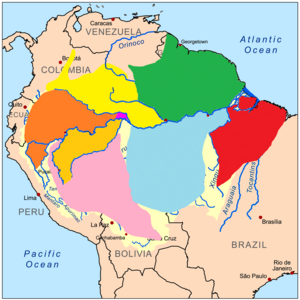Humboldt's squirrel monkey facts for kids
Quick facts for kids Humboldt's squirrel monkey |
|
|---|---|
 |
|
| Conservation status | |
| Scientific classification |
|
| Kingdom: | Animalia |
| Phylum: | Chordata |
| Class: | Mammalia |
| Order: | Primates |
| Suborder: | Haplorhini |
| Infraorder: | Simiiformes |
| Family: | Cebidae |
| Genus: | Saimiri |
| Species: |
S. cassiquiarensis
|
| Binomial name | |
| Saimiri cassiquiarensis (Lesson, 1840)
|
|
 |
|
| Ecuadorian squirrel monkey range in orange; remainder of Humboldt's squirrel monkey range in yellow | |
| Script error: The function "autoWithCaption" does not exist. | |
Script error: No such module "Check for conflicting parameters".
The Humboldt's squirrel monkey is a small, active monkey. Its scientific name is Saimiri cassiquiarensis. This monkey lives in the warm, green forests of South America. You can find it in countries like Brazil, Colombia, and Peru. It is known for its bright fur and long tail.
Contents
What is a Humboldt's Squirrel Monkey?
For a long time, scientists thought this monkey was just a type of common squirrel monkey. But in 2009, a special study changed that. Scientists looked closely at the monkey's genes. They found that the Humboldt's squirrel monkey was different enough to be its own species.
A Close Relative
There is another monkey called the Ecuadorian squirrel monkey. Scientists once thought it might be the same as the Humboldt's squirrel monkey. Now, most experts agree that the Ecuadorian squirrel monkey is a subspecies. This means it is a special type of Humboldt's squirrel monkey. Its full name is Saimiri cassiquiarensis macrodon.
Where Do Humboldt's Squirrel Monkeys Live?
These monkeys live in several South American countries. Their home includes parts of Brazil, Colombia, Ecuador, Peru, and Venezuela. They prefer to live in forests. The map in the box above shows where they can be found.
What Do Humboldt's Squirrel Monkeys Look Like?
Humboldt's squirrel monkeys are not very big. Their head and body together measure about 25 to 37 cm (9.8 to 14.6 in). Their tail is even longer, reaching 36 to 45 cm (14 to 18 in).
Fur Color
Their fur is similar to another monkey, the Guianan squirrel monkey. But there is one easy way to tell them apart. The fur at the base of the Humboldt's squirrel monkey's crown (the top of its head) is golden yellow. The Guianan squirrel monkey has gray fur in that same spot.
What Do Humboldt's Squirrel Monkeys Eat?
These monkeys enjoy a varied diet. They mostly eat fruits when they are available. This is usually between January and June. They also like to eat insects. Insects provide them with important protein.
See also
 In Spanish: Mono ardilla de Humboldt para niños
In Spanish: Mono ardilla de Humboldt para niños
 | Emma Amos |
 | Edward Mitchell Bannister |
 | Larry D. Alexander |
 | Ernie Barnes |


